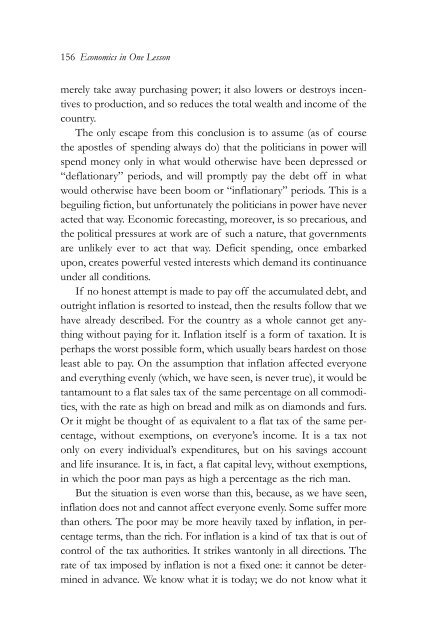1gDdM7w
1gDdM7w
1gDdM7w
- No tags were found...
You also want an ePaper? Increase the reach of your titles
YUMPU automatically turns print PDFs into web optimized ePapers that Google loves.
156 Economics in One Lessonmerely take away purchasing power; it also lowers or destroys incentivesto production, and so reduces the total wealth and income of thecountry.The only escape from this conclusion is to assume (as of coursethe apostles of spending always do) that the politicians in power willspend money only in what would otherwise have been depressed or“deflationary” periods, and will promptly pay the debt off in whatwould otherwise have been boom or “inflationary” periods. This is abeguiling fiction, but unfortunately the politicians in power have neveracted that way. Economic forecasting, moreover, is so precarious, andthe political pressures at work are of such a nature, that governmentsare unlikely ever to act that way. Deficit spending, once embarkedupon, creates powerful vested interests which demand its continuanceunder all conditions.If no honest attempt is made to pay off the accumulated debt, andoutright inflation is resorted to instead, then the results follow that wehave already described. For the country as a whole cannot get anythingwithout paying for it. Inflation itself is a form of taxation. It isperhaps the worst possible form, which usually bears hardest on thoseleast able to pay. On the assumption that inflation affected everyoneand everything evenly (which, we have seen, is never true), it would betantamount to a flat sales tax of the same percentage on all commodities,with the rate as high on bread and milk as on diamonds and furs.Or it might be thought of as equivalent to a flat tax of the same percentage,without exemptions, on everyone’s income. It is a tax notonly on every individual’s expenditures, but on his savings accountand life insurance. It is, in fact, a flat capital levy, without exemptions,in which the poor man pays as high a percentage as the rich man.But the situation is even worse than this, because, as we have seen,inflation does not and cannot affect everyone evenly. Some suffer morethan others. The poor may be more heavily taxed by inflation, in percentageterms, than the rich. For inflation is a kind of tax that is out ofcontrol of the tax authorities. It strikes wantonly in all directions. Therate of tax imposed by inflation is not a fixed one: it cannot be determinedin advance. We know what it is today; we do not know what it


